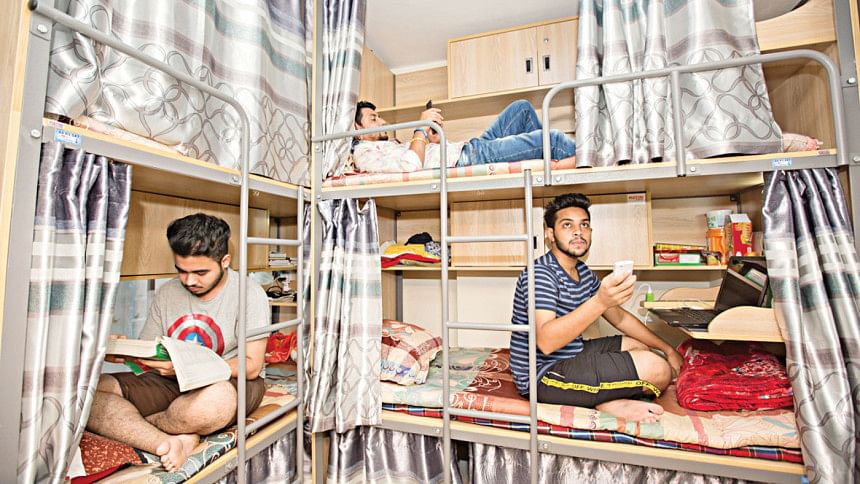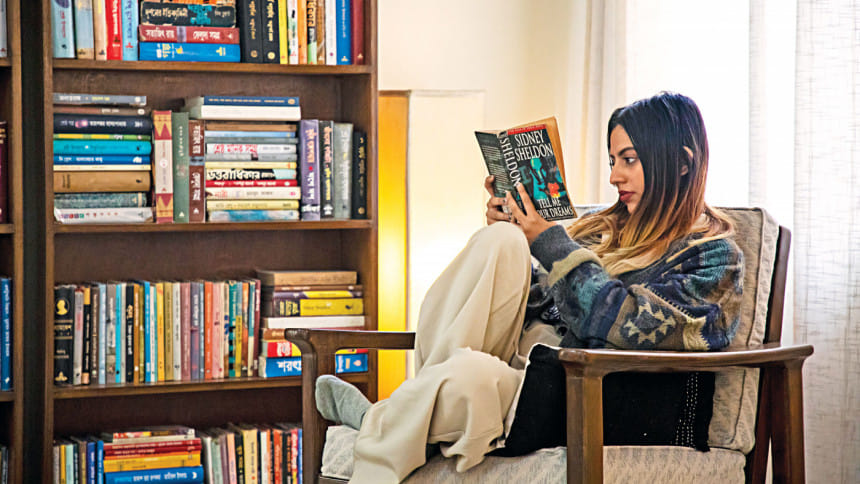The Challenges of Living as a Bachelor in Dhaka

As a fortunate young adult and student living with my family, I have come to appreciate the comforts of having a roof over my head, meals prepared for me (breakfast, lunch, and dinner), my clothes washed, and not having to worry about cleaning my room. This leads me to realise that there is a completely opposite and contrasting side, with the uncertainties that come with living alone as a bachelor.
Finding a place to live as a bachelor is one of the toughest challenges. Searching for apartments is physically and emotionally draining, and on top of that, when landlords discriminate against bachelors simply because of their status, it can be demoralising and difficult. Many landlords prefer not to rent to bachelors, and although this is unfortunate, it is not entirely unjustified. Bachelors sometimes delay rent payments or leave suddenly without notice, making it hard for landlords to find new tenants quickly. This financial strain and concerns about lifestyle choices contribute to landlords' reluctance.
However, it is unfair to judge all bachelors based on the actions of a few.
From the perspective of a student
"I wish the misconceptions about bachelors would disappear. Most landlords believe bachelors are unreliable and always make a mess in the house, but this is not true for all bachelors. Most of us are of age and mentally mature enough to live a decent and organised life. It should be understood that as university students, we face significant academic pressure. If our room is not always in pristine condition or our clothes and shoes are not always in their proper places, it is because we are stressed and dedicating our time and effort to our studies and personal lives," says Shamima Jahan Diba, an Economics major living at Bashundhara, and attending classes at Independent University, Bangladesh (IUB).
As a bachelor, it is important to present yourself well when dealing with landlords. Wear a smile, dress professionally, and demonstrate why you would be a reliable tenant. Keep your promises, maintain a good relationship with the landlord, and increase your chances of securing and keeping your apartment.

Students renting houses and living as bachelors face many struggles alongside their academic responsibilities, which can put their resilience to the test. One of the main issues faced by bachelor students is managing their food. They must bid farewell to the days of prepared meals made by their parents or housekeepers and take on the responsibility of managing their food on their own. No longer can they come home to find hot food ready or a cup of tea prepared by a housekeeper. Instead, they are left with two options: either eat from the local or university cafeteria or buy groceries and cook for themselves.
Expenses and strict guidelines imposed by landlords are two additional challenges that bachelors need to deal with. Curfews, gender separation, and similar restrictions affect all. Monthly expenses, such as groceries, transport, and, of course, rent, must all be managed independently. In cases where a few bachelors live together, expenses are shared, and supplies are divided and enjoyed collectively.
"I'm currently subletting an apartment with another family, and my monthly expenses include my rent, which is 7,500 BDT, my service charge covering gas, electricity, and water bills, and my groceries. Overall, I have a monthly expenditure of 15,000–20,000 BDT," informs Shamima.
Many bachelor students often worry about safety issues. Instances of theft or missing personal belongings are not uncommon, and landlords may not always address these concerns, dismissing them as part of their tenants' "personal lives." Break-ins and thefts have been reported in many bachelor residences, causing significant distress and adding to their already challenging lives.
Opportunities and housing scenario
Students can live in university dorms, which offer greater security and clarity regarding costs, as the university clearly specifies the rent, utility bills, and miscellaneous expenses.
Areas such as Bashundhara, which hosts two of the most prominent universities in Bangladesh, focus on housing bachelor students who wish to live near their respective educational institutions. Many students choose to share an apartment with 2 to 4 classmates, depending on the size and location of the house. This is a cost-effective way to live, as it allows them to split their monthly expenses. Utility bills, such as gas, electricity, and Wi-Fi, are divided among the tenants, leading to lower monthly expenditures.
Super Home BD, a Bangladeshi hostel/home renting company, provides housing for students. They offer packages (First Class, Business Class, and Standard Class) priced at 10,999 BDT, 9,999 BDT, and 8,999 BDT, respectively. All packages include three meals a day, an AC room, a personal locker, a luxurious lobby, laundry and cleaning services, an electric clothes dryer and hair dryer, a gym and cricket playing zone, fingerprint access, CCTV cameras and 24-hour security, a reading room and reading lamp, Wi-Fi services and USB sockets, a multifunctional bed, an RO system (purified water), a smart LED TV (65"), a generator and fire safety features, bedding, a pillow and pillow cover, and an auto shoe polisher and shoe shelf. Conditions apply to the different packages, and the Standard Class is the only package exempt from lift service. They provide accommodation throughout Dhaka for students across the city.
The TOLET, a tech company established in 2016, helps landlords connect with customers through its website and app. Landlords can post their houses or apartments on our platform, and customers can search for properties by location and price range. When they find a suitable option, they receive the landlord's contact information. A fee is charged when landlords post a listing, and customers pay a fee to obtain the landlord's contact details.
"TOLET was launched in 2016, and our app became available to the public in 2022. Initially, our focus was solely on bachelors. As a bachelor moving to Dhaka myself, I experienced the challenges of finding suitable housing firsthand. I initially relied on Facebook groups, but the process was disorganised, and it was difficult to find houses in the right areas with the right conditions. Facing these difficulties and being a developer, my team and I decided to train ourselves and develop an app specifically tailored for bachelors. Over time, families also began using and integrating into our services," says Amit Ghosh Antu, Founder of TOLET.
Amit told us that most bachelors are in Mirpur, with Tejgaon and Farmgate also being areas with a large number of bachelor residents.
"On average, 40% to 45% of residents are bachelors. However, there's an important observation to make. Nearly 70% of our apartment-seeking customers are bachelors, but families are the ones who tend to use our credit system to connect with landlords. As a result, the percentage of bachelors who actually use credits to secure houses falls within the 40% to 45% range," says Amit.
"We use a credit system in our app that works similarly to an e-wallet. We offer different packages for purchasing credits. Each credit is equivalent to 1 BDT (local currency). For example, a landlord who buys our 50-credit package can make 10 posts, with each post costing 5 credits. Similarly, customers have access to the same credit packages. When they want to get a landlord's contact number, they need 10 credits. All other details about the house are provided to customers for free. Our service connects landlords with potential renters, and credits are only required when customers wish to contact the landlord directly," informs Amit.


 For all latest news, follow The Daily Star's Google News channel.
For all latest news, follow The Daily Star's Google News channel. 



Comments